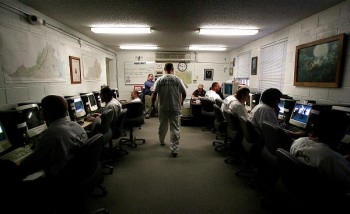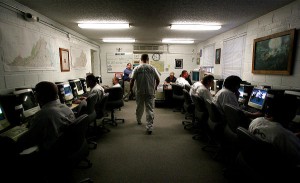I recently had an aha moment.
Fascinated by the fact that men have been commanded to keep records for their families, capture proceedings of the Church, and chronicle words of the prophets and the Savior for centuries—back when it was really difficult to molten ore, engrave the messages into metal, and lug around plates of brass or gold—today members of the Church are asked to do the same thing by writing histories for our own families. Yet, rather than engravings on precious metals, we press keys and slide our fingers across screens we hold in the palms of our hands. Libraries of data are literally now at our fingertips.
Technological Advances Help Further the Work of Family History
Thirty years ago I was involved in discussions about helping Brigham Young University (BYU) disseminate the resources of its library to other campuses all across the world. This was well before the Internet and seemingly an immense challenge. At that time, mountains of technological problems had to be overcome to achieve this goal. This task has now been realized, not only for BYU, but the entire Church – General Conference talks, performances, songs, and messages are nearly all available online – and technology provides access to scriptures, devotionals, and a myriad of lessons, videos, family history records, and other resources today that back then were beyond our wildest imaginations.President James E. Faust, at the October 1999 General Priesthood Session, noted the following:
The miracles of modern technology have brought efficiency into our lives in ways not dreamed of a generation ago, yet with this new technology has come a deluge of new challenges …
I hasten to add that scientific knowledge, the marvels of communication, and the wonders of modern medicine have come from the Lord to enhance His work throughout the world. As an example, the Church’s FamilySearch® Web site has more than seven million hits a day.
Today, we are the beneficiaries of those who kept their promises and chronicled the experiences of life by recording their stories, testimonies, and incidents to lift and edify. In this way, the work of God moves forward to bless his children all across the world. Ennobling influences of prayer, scripture study, frequent church and temple attendance, and obedience to the laws and ordinances of the gospel can literally move mountains. We must simply look to witness the fulfillment of these promises and endure in faith to see God’s work realize its destiny. “The keys of the kingdom of God are committed unto man on the earth, and from thence shall the gospel roll forth unto the ends of the earth, as the stone which is cut out of the mountain without hands” (Doctrine and Covenants 65:2).
Related Articles:
Thoughts on Creating a Genealogy Blog


